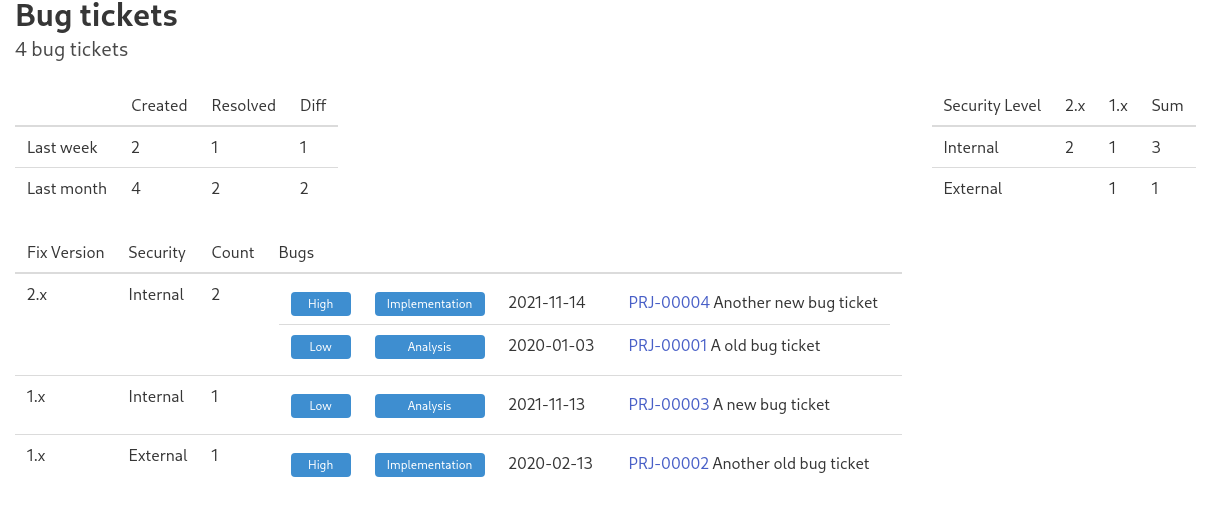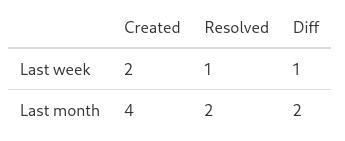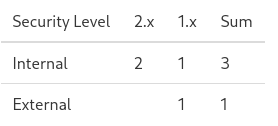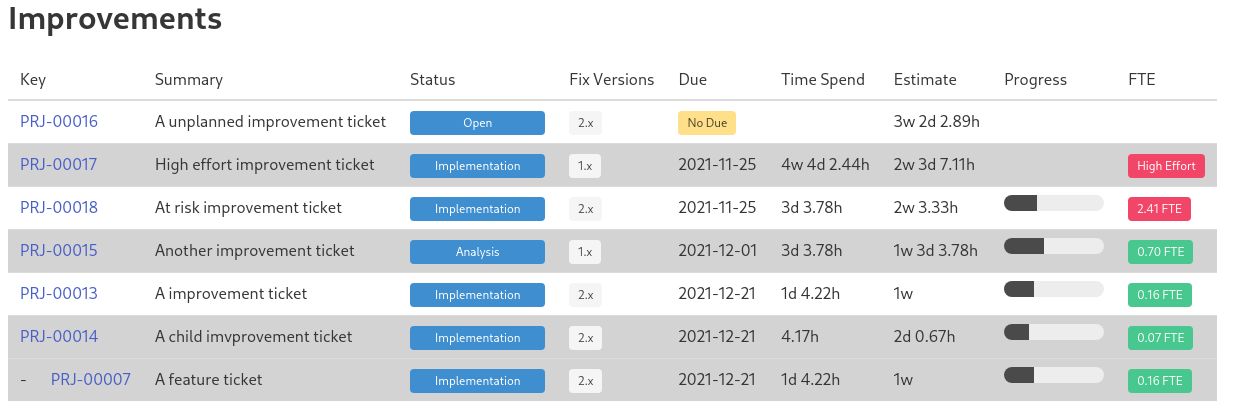JiraTicketStats is small tool to evaluate Jira tickets.
As input, a Jira Filter CSV export is used. An example Jira query is:
project = "XXX" and component = XXX and (resolutiondate is EMPTY or resolutiondate >= startOfDay(-365))
This query can be exported as CVS, separated by Semicolons, and used as input for this tool. To generate the report, run:
jiraticketstats -csv <path to your export>JiraTicketStats supports the following parameters:
- csv: Path to the Jira export.
- jira: Jira base URL to generate links. This URL + issue key should be valid.
- project: Jira project key to filter the issue set.
- component: Component name to filter the issue set.
- splitByComponent: Generate a report for each components of the issue set.
The file exmple.data contains some example issues. You can generate a example
test record with the command:
go run . -csv example.dataThis will generate a the reports report_.html (all tickets) and the module
report report_Module A.html. To generate just a module report, the parameter
component can be used.
The output of JiraTicketStats is an HTML report containing the following sections:
- Old bug tickets
- Bug tickets
- Features
- Improvements
- Other tickets
- Resources
- Warnings
The old bug tickets section consists of a table listing all bug tickets older than 30 days. For each ticket the following data is displayed:
- Issue: Jira ticket key and summary. The key is a link to the ticket in Jira.
- Age: The age of the tickets as days, calculated using the Jira creation date.
- Labels: All labels assigned to the ticket.
- Status: The current status of the ticket.
- Creator: The user name of the Jira user who created the ticket.
- Assignee: The user name of the Jira user who is assigned to the ticket.
The bug tickets section consists of three parts showing different bug ticket evaluations.
The first block show the change of ticket count in the last week and the last month. The "created" value is the sum of all bug tickets with a created date in the last week or month. The "resolved" value is the sum of all bug tickets with a resolved date in the last week or month. The "diff" is the difference between the two values, i.e. the change in the bug count.
The second block is a matrix listing the ticket number for each fix version and security level combination and a sum of the tickets for each security level.
The third block is a table of all tickets grouped by fix version and security level. For each ticket the priority, the status, the created date, the key and the summary is displayed.
The features section show a table containing all active feature tickets. Linked tickets are clustered. For each ticket the following information is displayed:
- Key
- Summary
- Status
- Fix Versions
- Due
- Time spend: Booked hours for the Jira ticket.
- Estimate: Estimated hours for the ticket.
- Progress: The ticket progress, calculated using time spend and the estimate.
- FTE: The necessary FTEs to do the remaining work while keeping the due date.
The improvements section shows the same information as the features section, but for the ticket type "Improvement" (config.Types.Improvement).
The other tickets section gives a small overview over the ticket count changes for the other ticket types, e.g. "Task" or "Sub-Task"
The resources section provides different evaluations of the spend work hours.
The first block gives an overview about the spend work hours and for which types and labels these hours were spend. The evaluated time ranges are last week, last month, last quarter and last year.
The second block gives an overview about the average (median an mean) work time for each ticket type. The evaluation considers all tickets with booked hours (time spend > 0) which were closed during the last quarter and during the last year.
The warnings section gives and overview of all tickets with sanitize check issues.
The first block shows all tickets without an assigned activity.
The second block shows all tickets with invalid work logs. A work log is considered invalid if the ticket has an assigned activity and the activity of a work log doesn't match this activity.
JiraTicketStats supports a configuration of different formats and external
constants, e.g. ticket names. These values are internally stored in a config
structure implemented in config.go. When the tool is executed, a file
config.json is read form the current working directory. If this file doesn't
exist it is created using default values.
JiraTicketStats is implemented using the package ticketstats and split in different
Go files, grouping logical sections.
JiraTicketStats is using Config data structures which groups different values,
mostly strings, required during the processing steps and configured in Jira,
e.g. type and state names. This is implemented in config.go.
It using two types of data models, one for evaluation implemented in issue.go,
and one for rendering, implemented in render.go.
JiraTicketStats reads the following field from the Jira export to the evaluation data type:
- "Summary -> issue.Summary (string)
- Issue key -> issue.Key (string)
- Issue id -> issue.Id (string)
- Parent id -> issue.Parent (string)
- Issue Type -> issue.Type (string)
- Status -> issue.Status (string)
- Priority -> issue.Priority (string)
- Assignee -> issue.Assignee (string)
- Creator -> issue.Creator (string)
- Created -> issue.Created (time.Time)
- Updated -> issue.Updated (time.Time)
- Last Viewed -> issue.LastViewed (time.Time)
- Affects Version/s -> issue.AffectsVersions ([]string)
- Fix Version/s -> issue.FixVersions ([]string)
- Component/s -> issue.Components ([]string)
- Log Work -> issue.LogWorks ([]WorkLog)
- Original Estimate -> issue.OriginalEstimate (Work)
- Remaining Estimate -> issue.RemainingEstimate (Work)
- Time Spent -> issue.TimeSpend (Work)
- Σ Original Estimate -> issue.SumOriginalEstimate (Work)
- Σ Remaining Estimate -> issue.SumRemainingEstimate (Work)
- Σ Time Spent -> issue.SumTimeSpend (Work)
- Security Level -> issue.SecurityLevel (string)
- Labels -> issue.Labels ([]string)
- Resolution -> issue.Resolution (string)
- Resolved -> issue.Resolved (time.Time)
- Due Date -> issue.Due (time.Time)
- Outward issue link (Blocks) -> issue.LinkBlocks ([]string)
- Outward issue link (Causes) -> issue.LinkCauses ([]string)
- Outward issue link (Cloners)-> issue.LinkCloners ([]string)
- Outward issue link (Dependency) -> issue.LinkDependencies ([]string)
- Outward issue link (Duplicate) -> issue.LinkDuplicates ([]string)
- Outward issue link (Issue split)-> issue.LinkIssueSplits ([]string)
- Outward issue link (Part) -> issue.LinkParts ([]string)
- Outward issue link (Relates) -> issue.LinkRelates ([]string)
- Outward issue link (Relation)-> issue.LinkRelations ([]string)
- Outward issue link (Triggers) -> issue.LinkTriggers ([]string)
- Outward issue link (linkIssue)-> issue.LinkLinkIssues ([]string)
- Outward issue link (parent) -> issue.LinkParents ([]string)
- config.Customs.ExternalId -> issue.CustomExternalId (string)
- config.Customs.SupplierReference -> issue.CustomSupplierRef (string)
- config.Customs.Variant -> issue.CustomVariant (string)
- config.Customs.Account -> issue.CustomActivity (string)
- config.Customs.Category -> issue.CustomCategory (string)
The implementation can be found issue.go.
The type 'WorkLog' is defined in issue.go and splits the Jira 'Log Work' data
into teh fields:
- Hours (Work)
- Date (time.Time)
- Activity (string)
The type Work is used to represent work hours. It is just a float64 with the unit work hours, not seconds as used by Jira.
For generating the report different types are used, supporting rendered values,
e.g. string instead of time.Time for dates. The data types for rendering are
defined in render.go. The main render function is Issue.ToReportIssue which
transforms an Issue to its report representation.
The statistic calculations are implemented in stats.go.
The main logic, for parsing the data, generating the data for the different
report sections and the rendering of the report is implemented in
ticketstats.go.













